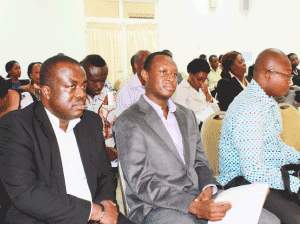Africa’s underachievement is well noted. For this reason, it has not productively utilised the potentially enticing demographic bulge consisting of a huge youthful population. To achieve sustainable development, the continent must develop a skills-based economy. DEJI DAVIES examines an option…..
The potential of the African continent as the last great frontier has been often stated. For a start, the infrastructure required to achieve sustainable development has to be built. However, to ensure the vital synergy, the hardware must go with the software.
If infrastructure in this instance represents the hardware, the development of a skills-based economy is the software. To build a modern diversified economy, skills have to be developed and re-trained across the sectors.
This is crucial. For it is a truism well-worn that with just a handful of exceptions, much of the economies of the African continent are mono-crop. In a time-honoured fashion, raw exports are sent forth to overseas markets without the requisite value-added.
This process, of course, short-changes the primary producer. Therefore, to move up to the next level on the value chain, the development of skills is the crucial catalyst. Providing an option here is Unique Enterprise LLC of Alton, Baltimore, Maryland in the United States of America. If Africa is to develop a skills-based economy, it has to develop a crop of managers who can drive the process.
This means that it has to feed raw talent through the world’s leading business schools. Makes sense if you are going to drive the development process in line with international best practices. In this line, Unique Enterprise collaborating with the Graduate Management Admission Council (GMAC), U.S., has developed the GMAT Africa Career Track Programme.
The objective of the programme is vital to Africa’s skills development acquisition thrust. It is an attempt to increase awareness in Africa of the nature of the GMAT (Graduate Management Admission Test) exam. As is well known, the GMAT is a standardised admission exam used by over 6,000 graduate programmes offered by about 1,500 universities/institutions in about 110 countries as part of the selection criteria for graduate admission. It is also useful in enhancing higher order reasoning skills and in employment testing.
For this reason, it is absolutely vital to increase awareness in Africa of the nature of the GMAT exam and its value for helping improve the representation and performance of prospective African graduate school applicants.
The programme will locally facilitate GMAT preparatory courses, as well as assist with enhancing the standards of local business schools’ pool of applicants. The process/exercise includes solutions that address the challenges of GMAT exam access and performance in Africa, by providing academic advisement and logistics support.
The strategy involves development and implementation of programmes with African universities that will help prepare students for graduate management study at internationally-recognised institutions. Benefits to participating African universities include:
Favourable market positioning to attract quality students and faculty.
Reputation for providing quality outcomes for students.
Enhanced institutional profile – both locally and internationally.
Global recognition as a reliable source of quality graduate management candidates.
Accelerated movement towards international recognition and accreditation.
Students also stand to benefit significantly from this initiative. The GMAT exam opens doors to quality graduate management education, while preparing for the exam actually develops higher order reasoning skills critical to both academic and career success. A good GMAT score also enhances access to a variety of quality programmes by increasing the likelihood of scholarship awards and other forms of financial assistance. The GMAT Africa Career Track programme will open opportunities for success to Africans prepared to take up the challenge.
The GMAT exam is crucialbecause it opens doors to academic and career success. Unfortunately, Africans typically avoid the GMAT exam because of their mistaken impression that the test is too difficult and that they cannot do well in it.
This unfortunate perception has to do with early education methods in most African countries. The method employed tends to focus on acquiring and memorising information. Far less attention is given to analysis or exploring the implications of what has been learned – a skill set that is especially critical to perform well on the GMAT exam and crucial in management. Africans sadly perform on average less well than students from other world regions. Not because they are less capable, but alas, because they have the feeling that are ill-prepared.
Preparation is critical because the GMAT exam is quite different from the conventional tests to which they are accustomed. Generally, they have only experienced tests that assess mastery of recently learned/memorised content. In contrast, the GMAT exam is a test of higher order reasoning skills that assesses one’s ability to think or “reason” with established knowledge.
This is why Unique Enterprise is seeking a collaborative relationship with the University of Lagos (UNILAG) and other institutions in Nigeria in the implementation of this programme in Lagos. Initiatives such as this are vital to the development of Africa’s economy. For Africa, the future lies in skills acquisition.













